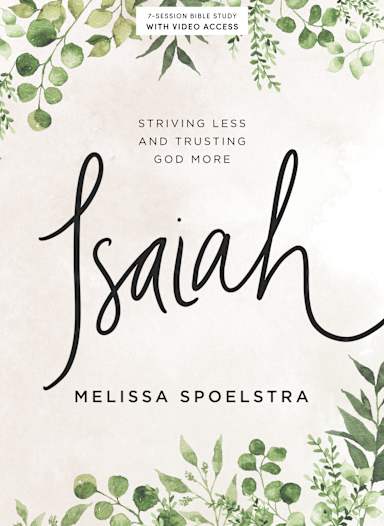When it comes to calendars, I like to have a month at a glance so I can see the broad strokes of my schedule. I always buy a planner that also has weekly pages so I can flesh out each day more meticulously with meeting times, deadlines, and my daily to-do list. Depending on your personality type, you may not be as attached to your calendar as I am, but all of us need a system for keeping track of life.
No matter how you manage your time, most of us would admit we struggle to trust God's calendar. The Lord calls us to plan wisely (Ps. 90:12). We all must make decisions about our routines and time commitments including work, rest, relationships, hobbies, social media, and so on. On the other hand, we all know that our best laid plans often get hijacked by emergencies, unforeseen circumstances, or even global pandemics!
As we endeavor to trust God's calendar, we need wisdom to discern what to pencil into ours. Isaiah's message gives us practical insights that will help us make plans while holding them loosely in anticipation of divine interventions.
1. Remember what God has done in the past (Isa. 46).
Notice how the gods of Babylon had to be carried (v. 1), but the Lord said He would carry His people (v. 4). Isaiah used this play on words to remind his readers that idols were man-made objects. They weren't real. Without intentional remembering, we can also get swept into the superficial thinking of our culture. What we believe will drive how we prioritize our time. The Lord challenged His people to remember what He had done in the past so they would trust Him instead of worthless counterfeits.
These reminders weren't intended only for the original audience. The Lord also calls us to remember His work in our own stories. Some of your marked moments might include protection from harm, comfort during a season of grief, encouragement when you needed it most, or something totally different.
2. Reflect on choices in the present (Isa. 47).
We want to remember what God has done in the past, but we also need to reflect on our choices in the present. The Lord punished Babylon for acting thoughtlessly. He calls us to pause in the midst of our busy days to think about what we are doing, why we are doing it, and how it will impact others. I've found that taking just five or ten minutes to stop, pray, and remember what I'm doing and why I'm doing it has been so helpful.
You may employ other methods of reflection, but all of us can heed the Lord's call to think more deeply. When Jesus was accused of breaking the Sabbath (by healing of all things), He challenged people not to get caught in the shallow end of God's plan. He ended His teaching with these words, "Look beneath the surface so you can judge correctly" (John 7:24). This command summarizes God's message through Isaiah regarding reflecting on our actions. God wants us to be mindful of living for Him rather than just going through the motions of Christianity.
"When you attach your trust to God's eternal blessings rather than ease, convenience, and trouble-free circumstances here on earth, you can more easily surrender your calendar to His control."
Melissa Spoelstra
3. Reaffirm God's goodness for the future (Isa. 51:9-16).
The Lord not only calls us to remember the past and reflect on the present but also to look toward the future. A future with God is a future with hope. God entrusted Isaiah with details of the Babylonian exile, punishment, and return. Isaiah also gave the people glimpses of God's future goodness to them. Whether we are in the midst of a season of prosperity or desperation, we can all look to the future with anticipation.
Before the future captivity would unfold, the Lord wanted the people to know ahead of time that He would rescue them. He gave them a peek at His divine calendar so they could be prepared, but also so they could trust Him through the process. However, like many of us, the Israelites quickly forgot about God's past faithfulness, present power, and future promises.
The Lord's accusation against them was forgetfulness. He reminded them that He had stretched out the sky like a canopy and laid the foundations of the earth in times past (v. 13). Then He spoke of His present power as the Lord who "stirs up the sea, causing its waves to roar" (v. 15). God told them what they could expect in the future so they would know they belonged to Him, "the LORD of Heaven's Armies" (v. 15).
You may or may not be of Jewish descent, but if you have turned from your sin and turned to God, then you belong to Him. What we glean from Isaiah's words is the importance of trusting God's calendar. We remember the past, reflect in the present, and reaffirm the future hope in God's good plans for our lives.
When you attach your trust to God's eternal blessings rather than ease, convenience, and trouble-free circumstances here on earth, you can more easily surrender your calendar to His control. Things may be written in your planner that you didn't anticipate. I know you didn't write cancer, divorce, a breakup, or a miscarriage into your schedule.
God longs to walk with you through each and every day, whether it is marked with difficulty or celebration.
These passages helped me to process through the tension I feel between these two statements: God calls me to plan wisely; and God calls me to trust His plan. I believe we reconcile both of these truths as we loosen our grip on our own agendas. Reflection doesn't come naturally for me, but I want to grow in remembering, considering the impact of my decisions, and smiling at the future. I'm asking the Lord to show me how to implement reflection in my life, and I hope He is stirring your heart as well.
Excerpted from Isaiah: Striving Less and Trusting God More © 2022 Melissa Spoelstra. Published by Lifeway Press®.
In this 7-session Bible study, Isaiah’s words reveal that you can trust God more than your own human effort or the counterfeits of the world. Instead of striving harder, learn to trust more deeply in the Faithful One who is worthy of our dependence, finding the comfort and peace you need to sustain you.

